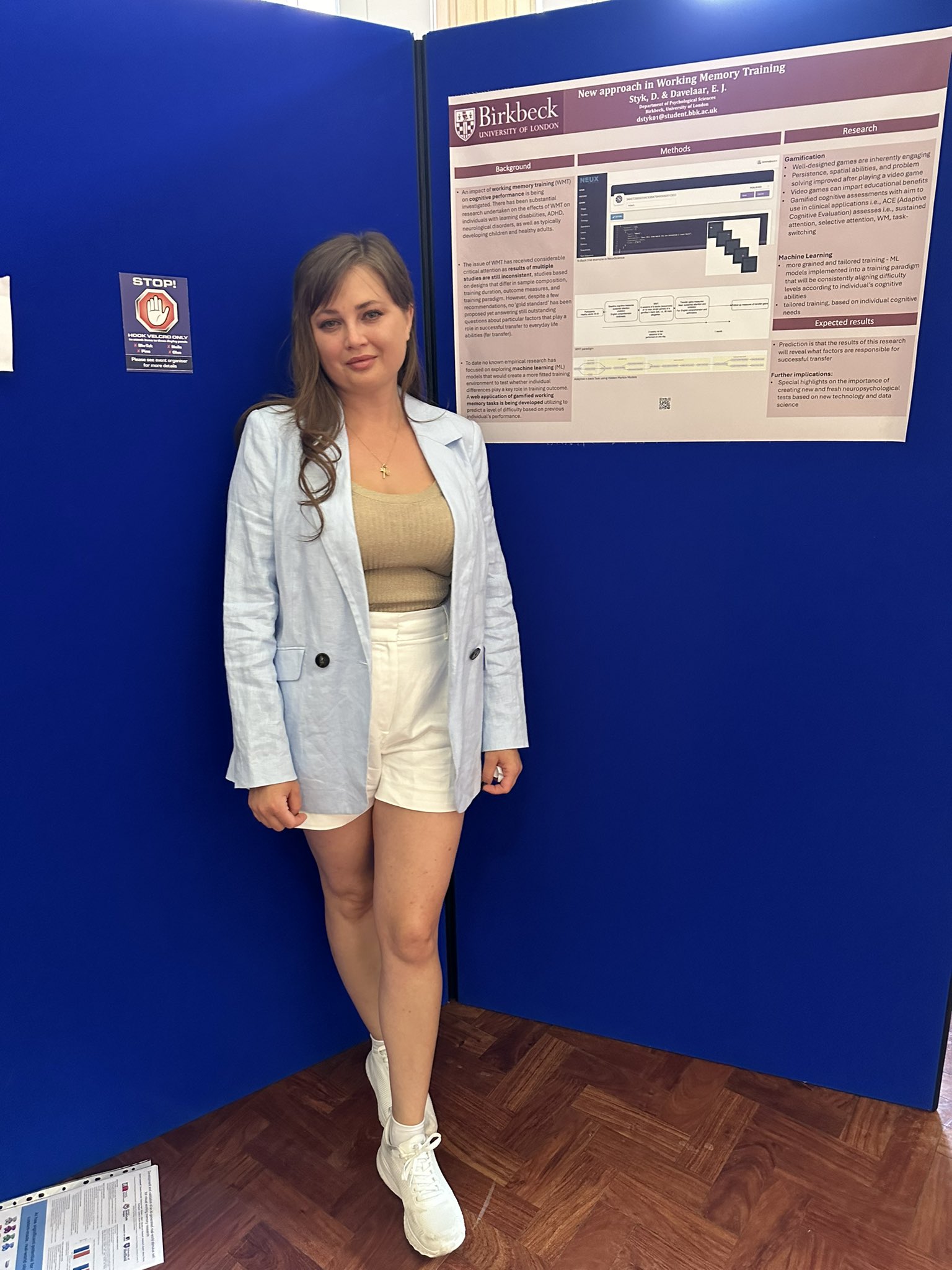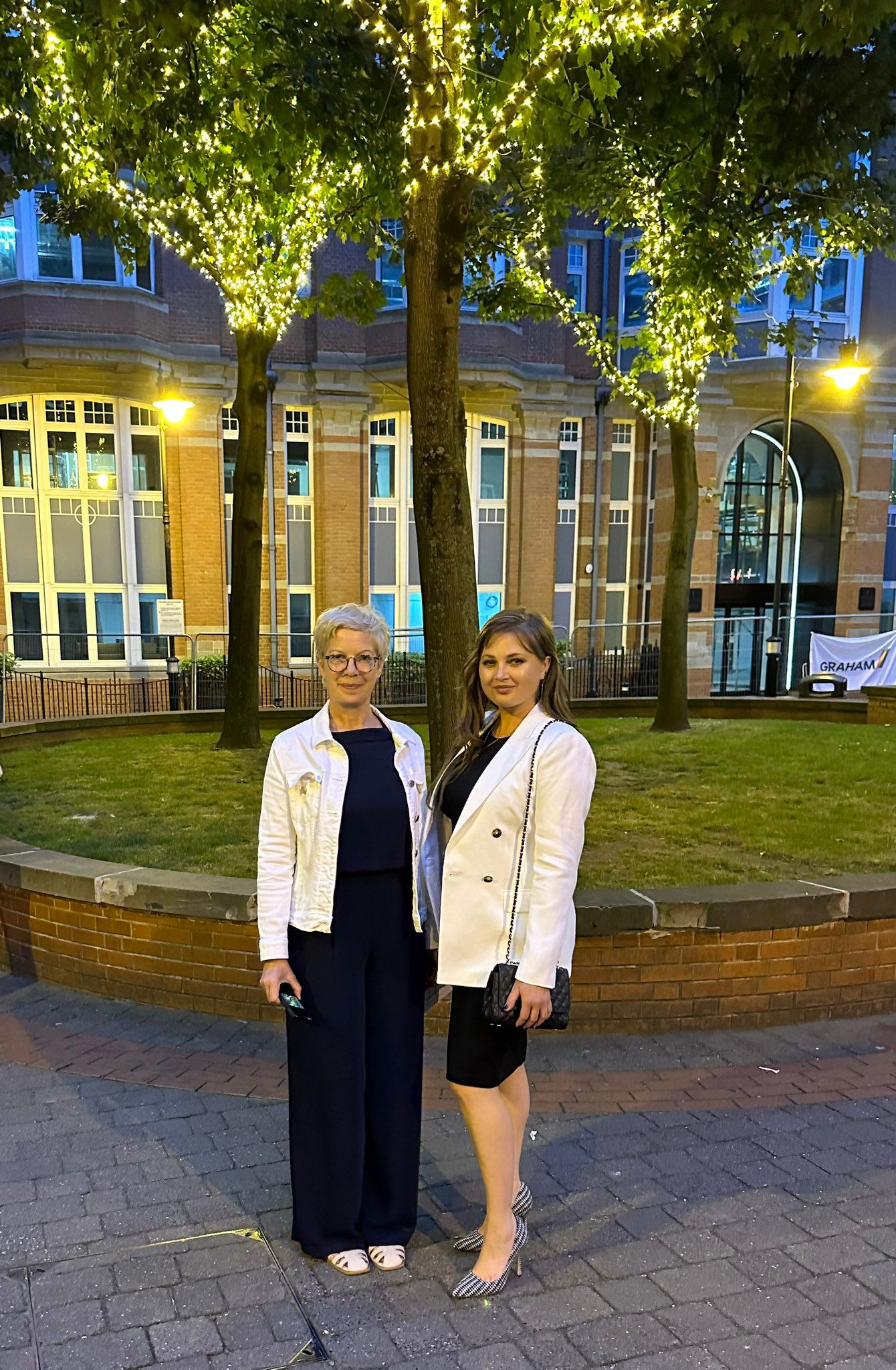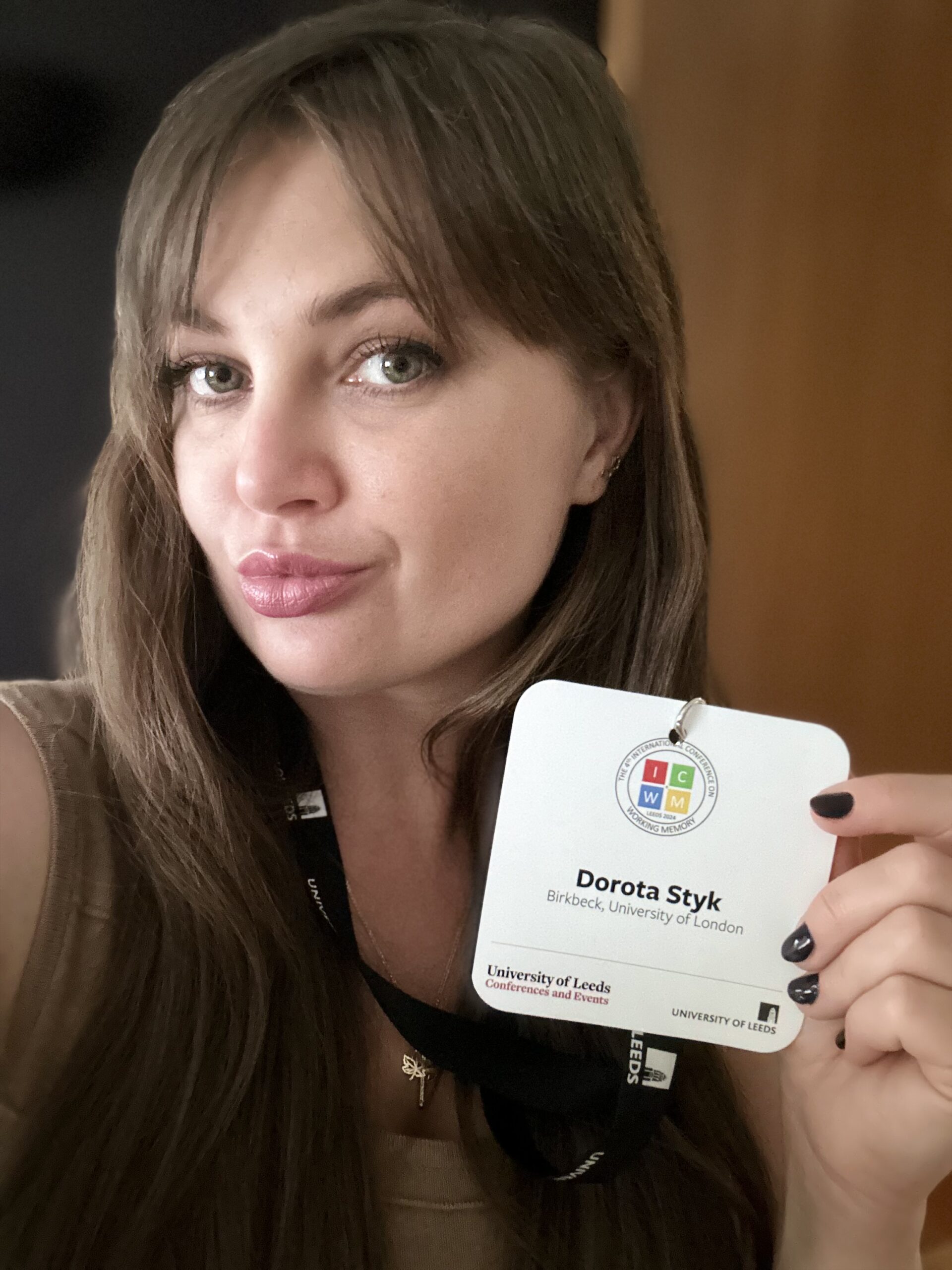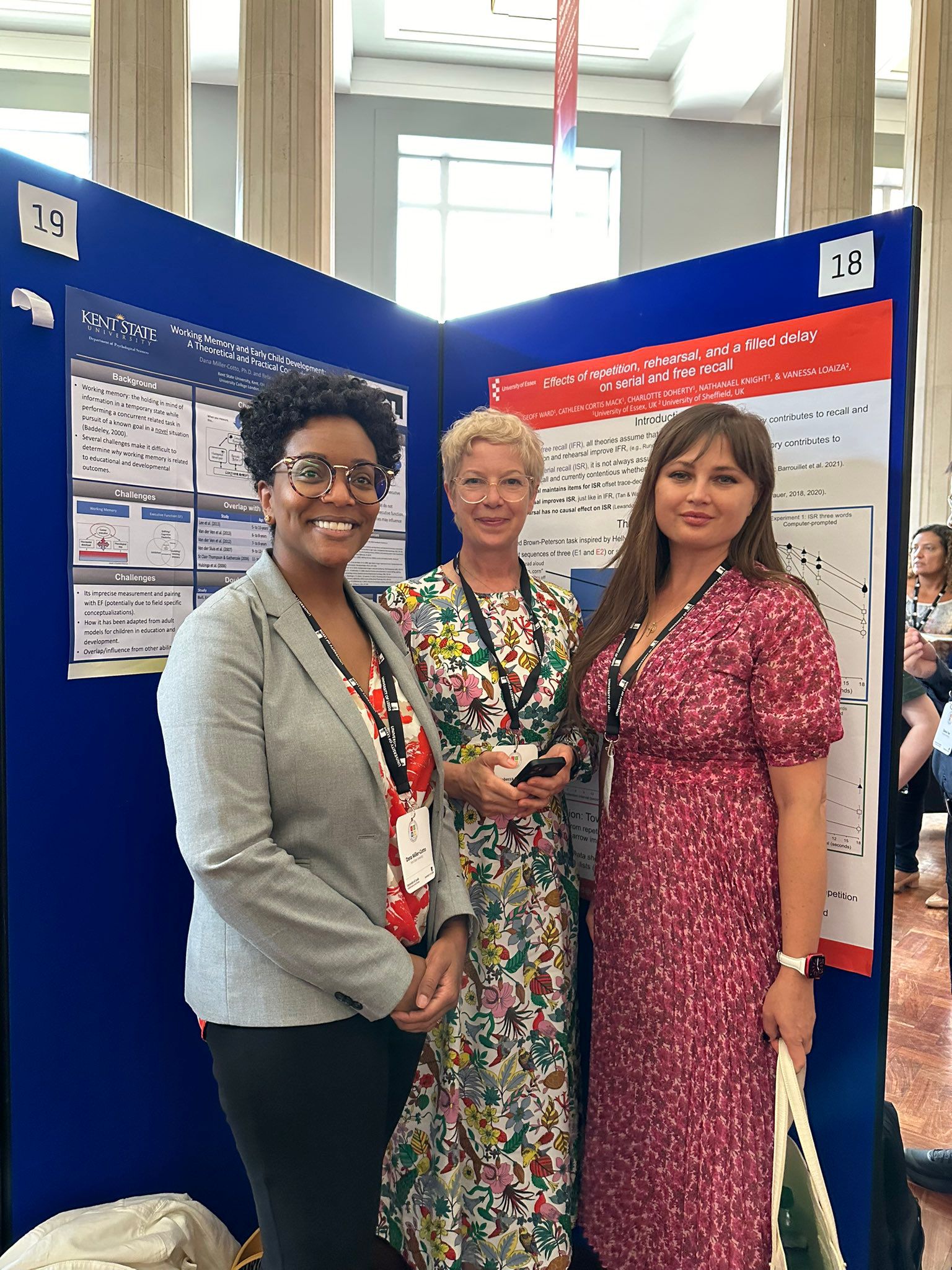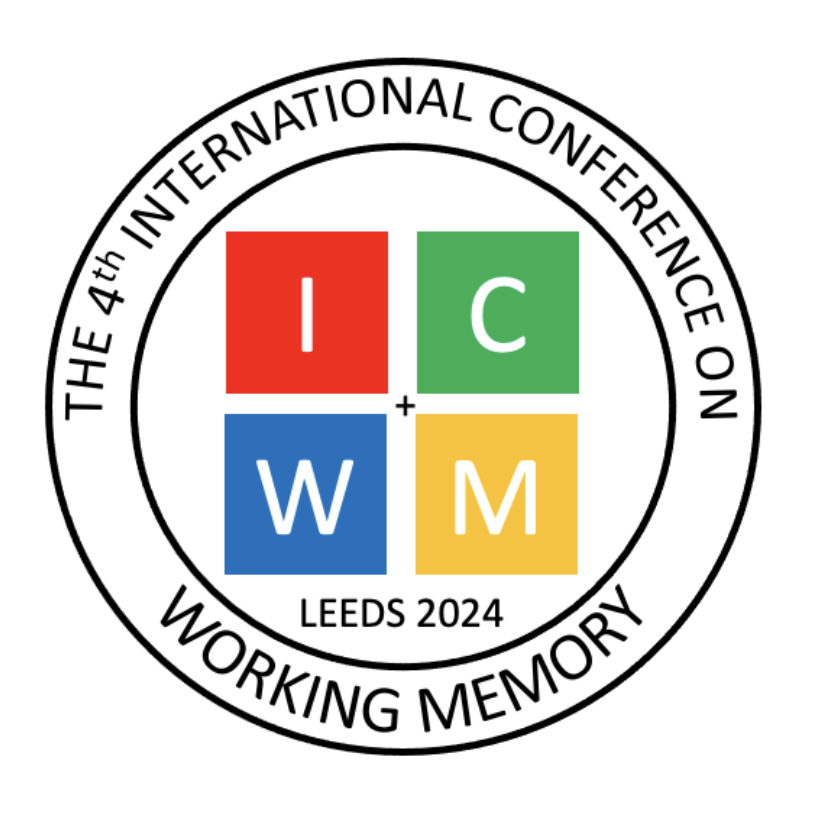
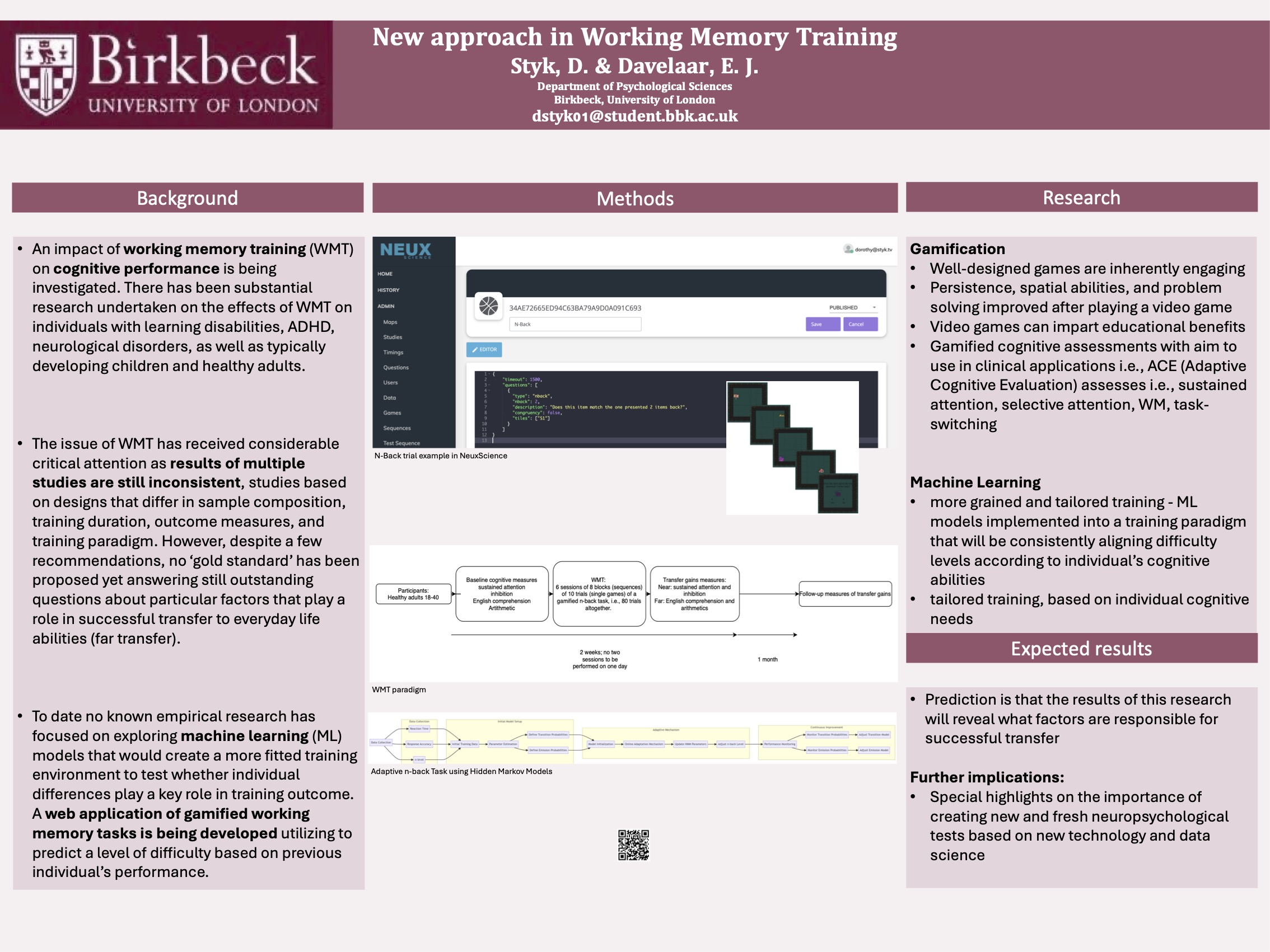
Abstract
Dorota Styk & Eddy J. Davelaar
School of Psychological Sciences
Birkbeck, University of London
Novel approach in Working Memory Training
Substantial research has been undertaken on the effects of working memory training (WMT) on individuals with learning difficulties, ADHD, and neurological disorders, as well as typically developing children and healthy adults.
The question of the efficacy of WMT has received considerable critical attention as the results of multiple studies are still inconsistent, which may be due to differences in study designs, study samples, training duration, outcome measures, and the training paradigm itself. However, despite a few recommendations, no ‘golden standard’ has yet been proposed to answer the questions about what factors play a critical role in successful transfer to everyday life abilities (far transfer). Until now, no known empirical research has focused on exploring machine learning (ML) models that would create a more optimal working memory training environment to address the role of individual differences in training outcomes. We are developing a web application of gamified working memory tasks using Hidden Markov Models to predict the level of difficulty based on an individual’s performance. We anticipate that this approach will support the identification of which factors are responsible for successful transfer. Moreover, this may also highlight the importance of upgrading current testing methods and creating innovations for behavioural testing.
References
References:
Åkerlund E, Esbjornsson E, Sunnerhagen KS, Bjorkdahl A (2013). Can computerized working memory training improve impaired working memory, cognition and psychological health? Brain Inj 27:1649-1657.
Björkdahl A, Akerlund E, Svensson S, Esbjornsson E (2013) A randomized study of computerized working memory training and effects on functioning in everyday life for patients with brain injury. Brain Inj 27:1658-1665.
Baddeley, A. & Hitch, G. (1974). Working memory. Psychology of Learning and Motivation, 8, 47-89.
Baddeley, A. (2012). Working Memory: theories, models, and controversies. Annual Review of Psychology, 63, 1 – 29.
Baddeley, A., Hitch, G., & Allen, R. (2021). A Multicomponent Model of Working Memory. In R. H. Logie, V. Camos, & N. Cowan (Ed.). Working Memory State of the Science (85 – 115). Oxford University Press.
Barrouillet, P., & Camos, V. (2021). The Time-Based Resource-Sharing Model of Working Memory. In R. H. Logie, V. Camos, & N. Cowan (Ed.). Working Memory State of the Science (85 – 115). Oxford University Press.
Beck, S. J., Hanson, C. A., Puffenberger, S. S., Benninger, K. L., Benninger W. B. (2010). A controlled trial of working memory training for children and adolescents with ADHD. JClinChild Adolescent Psychology 39, 825 – 836.
Berger, E. M., Fehr, E., Hermes, H., Schunk, D., & Winkel, K. (2020). The impact of working memory training on children’s cognitive and noncognitive skills. NHH, ISSN: 0804-6824.
Bergman-Nutley S, Klingberg T. (2014). Effect of working memory training on working memory, arithmetic and following instructions. Psychological Research 78(6):869–877. doi: 10.1007/s00426-014-0614-0.
Bigorra, A., Garolera, M., Guijarro, S., & Hervas, A. (2015). Long-term far-transfer effects of working memory training in children with ADHD: a randomized controlled trial. Eur Child Adolescent Psychiatry.
Carlson-Green B, Puig J, Bendel A (2017). Feasibility and efficacy of an extended trial of home-based working memory training for pediatric brain tumor survivors: a pilot study. Neurooncol Pract 4, 11-120.
Chuderski, A. (2013). When are fluid intelligence and working memory isomorphic and when are they not? Intelligence, 41, 244-262.
Conklin HM, Ashford JM, Clark KN, Martin-Elbahesh K, Hardy KK, Merchant TE, Ogg RJ, Jeha S, Huang L, Zhang H (2017) Long-Term Efficacy of Computerized Cognitive Training Among Survivors of Childhood Cancer: A Single-Blind Randomized Controlled Trial. J Pediatr Psychol 42:220-231.
Conklin HM, Ogg RJ, Ashford JM, Scoggins MA, Zou P, Clark KN, Martin-Elbahesh K, Hardy KK, Merchant TE, Jeha S, Huang L, Zhang H (2015) Computerized Cognitive Training for Amelioration of Cognitive Late Effects Among Childhood Cancer Survivors: A Randomized Controlled Trial. J Clin Oncol 33:3894-3902.
Chacko, A., Bedard, A. C., Marks, D. J., Feirsen, N., Uderman, J. Z., Chimiklis, A., Rajwan, E., Cornwell, M., Anderson, L., Zwilling, A., Ramon. M. (2014). A randomized clinical trial of Cogmed Working Memory Training in school-age children with ADHD: A replication in a diverse sample using a control condition. Journal of Child Psychology and Psychiatry. 55(3), 247 – 255.
Cowan, N., Morey, C. C., & Naveh-Benjamin, M. (2021). An Embedded-Processes Approach to Working Memory: How Is It Distinct from Other Approaches, and to What Ends? In R. H. Logie, V. Camos, & N. Cowan (Ed.). Working Memory State of the Science (44 – 84). Oxford University Press.
Diamond, A. (2016). Why assessing and improving executive functions early in life is critical. In P. McCardle, L. Freund, & J. A. Griffin (Eds.), Executive Function in Preschool-age Children: Integrating Measurement, Neurodevelopmental, and Translational Research (pp. 11- 43). Washington, DC: American Psychological Association.
Diamond, A. & Ling, D. S. (2020). Review of the evidence on, and fundamental questions about, efforts to improve executive functions, including working memory. In J. M. Novick, M. F. Bunting, M. R. Dougherty, & R. W. Engle (Ed.). Cognitive and Working Memory Training: Perspectives from Psychology, Neuroscience and Human Development (pp. 143 – 431).
Dunning, D. L., Holmes, J., & Gathercole, S. E. (2013). Does working memory training lead to generalized improvements in children with low working memory? A randomized controlled trial. Developmental Science, 16(6), 915 – 925.
Egeland, J., Aarlien, A. K., Saunes, B. K. (2013). Few effects of far transfer of working memory training in ADHD: A Randomized controlled trial. PLoS One 8.
Fälth, L., Jaensson, L., & Johansson, K. (2015). International Journal of Learning, Teaching and Educational Research, 14(2), 28 – 35.
Friedman, N. P., & Miyake, A. (2018). Unity and Diversity of Executive Function: Individual Differences as a Window on Cognitive Structure. Cortex 86, 186 – 204.
Gathercole, S., & Alloway, T. P. (2012). Working Memory & Learning. A practical Guide for Teachers. SAGE Pub.
Green, C. T., Long, D. L., Green, D., Iosif, A. M., Dixon J. F., Miller, M. A., Fassbender, C., & Schweitzer, J. B. (2012). Will working memory training generalize to improve off-task behaviour in children with Attention-deficit/Hyperactivity Disorder? Neurotherapeutics.
Grooper, R. J., Tannock, R. (2009). A pilot study of working memory and academic achievement in college students with ADHD. Journal of attention disorders 12, 574 – 581.
Hakim, N., Awh, E. & Vogel, E. K. (2021). Manifold Visual Working Memory. In R. H. Logie, V. Camos, & N. Cowan (Ed.). Working Memory State of the Science (311 – 332). Oxford University Press.
Hambrick, D. Z., Burgoyne, A. P., & Araujo, D. (2021). Working Memory and Expertise: An Ecological Perspective. In R. H. Logie, V. Camos, & N. Cowan (Ed.). Working Memory State of the Science (212 – 234). Oxford University Press.
Hardy KK, Willard VW, Allen TM, Bonner MJ (2013) Working memory training in survivors of pediatric cancer: a randomized pilot study. Psychooncology 22:1856-1865.
Holmes, J., Gathercole, S. E., & Dunning, D. L. (2009). Adaptive training leads to sustained enhancement of poor working memory in children. Developmental Science, 12(4), F9 – F15.
Jaeggi, S. M., Buschkuehl, M., Jonides, J.& Perrig, W. J. (2008). Improving fluid intelligence with training on working memory. Proceeding of the National Academy of Science, 105(19), 6829 – 6833.
Jaeggi, S. M., Studer-Luethi, B., Buschkuehl, M., Su, Y. F., Jonides, J., & Perrig, W. J. (2010). The relationship between n-back performance and matrix reasoning – implications for training and transfer. Intelligence, 38(6), 625 – 635.
Johansson B, Tornmalm M (2012) Working memory training for patients with acquired brain injury: effects in daily life. Scand J Occup Ther 19:176-183.
Kane, M.J., & Engle, R. W. (2002). The role of prefrontal cortex in working memory capacity, executive attention, and general fluid intelligence. An individual differences perspective. Psychon Bull Rev 9, 637 – 671.
Karbach, J., Strobach, T., & Schubert, T. (2015). Adaptive working-memory training benefits reading, but not mathematics in middle childhood. Child Neuropsychology
Klingberg, T., Forssberg, H, & Westerberg, H. (2002). Training of working memory in children with ADHD. Journal of Clinical and Experimental Neuropsychology, 24(6), 781 – 791.
Klingber, T., Fernell, E., Olsen, P. J., Johnson, M., Gustafsson, P., Dahlström, K., Gillberg, C. G., Forssberg, H., & Westerberg, H. (2005). Computerized training of working memory in children with ADHD – a randomized, controlled trial. Journal of the American Academy of Child & Adolescent Psychiatry, 44(2), 177 – 186.
Logie, R. H., Belletier, C. & Doherty, J. M. (2021). Integrating Theories of Working Memory. In R. H. Logie, V. Camos, & N. Cowan (Ed.). Working Memory State of the Science (389 – 429). Oxford University Press.
Lundqvist A, Grundstrom K, Samuelsson K, Ronnberg J (2010) Computerized training of working memory in a group of patients suffering from acquired brain injury. Brain Inj 24:1173-1183.
Marchetta, N. D. J., Hurks, P. P. M., De Sonneville, M. J., Krabbendam, L., Jolles. (2007). Sustained and focused attention deficits in adult ADHD. J Atten Disord 11(6), 664- 678.
Martin, R. C., Rapp, B., & Purcell, J. (2021). Domain-Specific Working Memory: Perspectives from Cognitive Neuropsychology. In R. H. Logie, V. Camos, & N. Cowan (Ed.). Working Memory State of the Science (235 – 281). Oxford University Press.
Mashburn, C. A., Tsukahara, J. S., & Engle, R. W. (2021). Individual Differences in Attention Control: Implications for the Relationship Between Working Memory Capacity and Fluid Intelligence. In R. H. Logie, V. Camos, & N. Cowan (Ed.). Working Memory State of the Science (175 – 211). Oxford University Press.
McCabe, D.P., Roediger III, H. L., McDaniel, M. A., Balota, D. A., Hambrick, D. Z. (2010). The relationship between working memory capacity and executive functioning: Evidence for a common executive attention construct. Neuropsychology 24(2), 222 – 243.
Miyake A, Friedman NP, Emerson MJ, Witzki AH, Howerter A, Wager TD. (2000). The unity and diversity of executive functions and their contributions to complex frontal lobe tasks: A latent variable analysis. Cognitive Psychology.41:49–100.
Partanen, P., Jansson, B., Lisspers, J., & Sundin, Ö. (2015). Metacognitive Strategy Training Adds to the effects of working memory training in chikdren wirh soecial educational needs. International Journal of Psychological Studies, 7(3), 130 – 140.
Oberauer, K. (2021). Towards a Theory of Working Memory: From Metaphors to Mechanisms. In R. H. Logie, V. Camos, & N. Cowan (Ed.). Working Memory State of the Science (116 – 149). Oxford University Press.
Oberauer, K., Schulze, R., Wilhelm, O., & Süß, H. M. (2005). Working memory amd intelligence – their correlation and their relation: A comment on Ackerman, Beier, and Boyle (2005). Psychological Bulletin, 131, 61 – 65.
Peers PV, Astle DE, Duncan J, Murphy FC, Hampshire A, Das T, Manly T (2020) Dissociable effects of attention vs working memory training on cognitive performance and everyday functioning following fronto- parietal strokes. Neuropsychol Rehabil 30:1092-1114.
Postle, B. R. (2021). Cognitive Neuroscience of Visual Working Memory. In R. H. Logie, V. Camos, & N. Cowan (Ed.). Working Memory State of the Science (333 – 357). Oxford University Press.
Reuter-Lorenz, P. A., & Iordan, A. D. (2021). Remembering Over the Short and Long Term: Empirical Continuities and Theoretical Implications. In R. H. Logie, V. Camos, & N. Cowan (Ed.). Working Memory State of the Science (282 – 310). Oxford University Press.
Roberts, G., Quach, J., Spencer Smith, M., Anderson, P., Gathercole, S., Gold, L., Sia, K. L., Mensah, F., Rickards, F., Ainley, J., & Wake, M. (2016). Working memory intervention does not improve long-term academic outcomes: A school-based population randomised controlled trial. JAMA Pediatr.
Shah, P. & Miyake, A. (1999). Models of Working Memory: An introduction. In A. Miyake & P. Shah (Eds.), Models of Working Memory: Mechanism of active maintenance and executive control (pp. 1-26). New York: Cambridge University Press.
Stievano, P., & Valeri, G. (2013). Executive functions in early childhood: Interrelations and structural development of inhibition, set-shifting and working memory. Neuropsychological Trends 13(1), 27 – 45.
Shipstead, Z. & Engle, R. W. (2018). Mechanisms of Working Memory Capacity and Fluid Intelligence and Their Common Dependence on Executive Attention. In R. J. Sternberg (Ed.) The Nature of Human Intelligence (pp. 287 – 307), Cambridge University Press.
Unsworth, N., Fakuda, K., Awh, E., & Vogel, E. K. (2014). Working memory and fluid intelligence: Capacity, attention control, and secondary memory retrieval. Cognitive Psychology, 71, 1-26.
Vandierendonck, A. (2021). Multicomponent Working Memory System with Distributed Executive Control. In R. H. Logie, V. Camos, & N. Cowan (Ed.). Working Memory State of the Science (150 – 174). Oxford University Press.
Westerberg H, Jacobaeus H, Hirvikoski T, Clevberger P, Ostensson J, Bartfai A, Forssberg H, Klingberg T (2007) Computerized working memory training – a method of cognitive rehabilitation after stroke. Brain Inj 21:21-29.
Wijeakumar, S., & Spencer, J. (2021). A Dynamic Field Theory of Visual Working Memory. In R. H. Logie, V. Camos, & N. Cowan (Ed.). Working Memory State of the Science (358 – 388). Oxford University Press.
Yin, A. S., Lee, K., Cheam, F., Poon, K., & Koh, J. (2015). Updating and working memory training: immediate improvement, long-term maintenance, and generalizability to non-trained tasks. Journal of Applied Research in Memory and Cognition.

